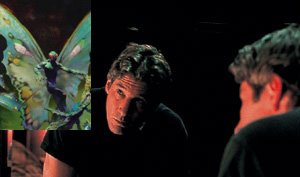Let sleeping moths lie
 My wife, who devours fiction voraciously, can expect a significant chunk of her for-fun reading to be adapted for one or the other screen at some point. The Lord of the Rings was a massive blast from my reading past, and I certainly can't help having discovered the works of Lovecraft and Philip K. Dick long after they began to be butchered by screenwriters and producers (here's hoping A Scanner Darkly is an exception). Yet the out-there but ostensibly nonfictional books I cherish are hardly ever tapped by the entertainment industry.
My wife, who devours fiction voraciously, can expect a significant chunk of her for-fun reading to be adapted for one or the other screen at some point. The Lord of the Rings was a massive blast from my reading past, and I certainly can't help having discovered the works of Lovecraft and Philip K. Dick long after they began to be butchered by screenwriters and producers (here's hoping A Scanner Darkly is an exception). Yet the out-there but ostensibly nonfictional books I cherish are hardly ever tapped by the entertainment industry.So when I catch wind of any potential media cross-pollination - or cooptation - a queasy mixture of delight and trepidation curdles in my gut. "Holy crap! How cool is that! But you know it's gonna suck..." Since I don't have to deal with this conflictedness very often, I vacillate wildly between a panting anticipation and the sour-grapes cynicism of the bruised optimist.
Just such curdling and vacillation erupted with a vengeance when the first ads for The Mothman Prophecies ran on TV.
Perhaps to you this was Richard Gere in a love triangle with TV's "Grace" and a fiery-eyed flying humanoid. To the director it was "a meditation on the existential dilemma of humankind seeking stability and certitude in the flux and chaos of the phenomenal world." (I may have put some words in his mouth, but dude basically said that. Basically.) But to me, this was a treasure uncovered in a childhood spent raiding small-town libraries, one of the few books I ever checked out repeatedly, a riotously iconoclastic oddity in a genre characterized by its oddness.
I couldn't bring myself to pay to see it in the theaters, nor have I laid out cash to rent it. Just a half-hour stolen from motel HBO on our cross-country move last summer. It was enough.
Enough to confirm that (a) the movie deviated from the book in frustratingly predictable ways, which confirmed that (b) studio-system hacks have no faith in or respect for their source material. You're making a creepy supernatural thriller; is the story not creepy enough as it is? Flying saucers? Poltergeists? Honest-to-God Men in Black intimidating witnesses? Phone calls filled with mechanical noises, strings of numbers, unplaceably foreign voices? And a seven-foot winged sumbitch with glowing eyes who chases people down back roads in the middle of the night? What?!?!
So the screenwriter may have to prune some of the overabundant detail and frequent digressions with which John Keel seasoned his punchy journalistic prose. And it probably is not necessary to do anything but hint at Keel's acid-tinged synthesis of ufology, paranormalism, and demonology. I'd even be OK with setting the events leading up to Point Pleasant's Silver Bridge collapse in the present day, if only to avoid bloating the production budget.
But how the hell does it improve the story to saddle our heroic investigator with a tragically ended marriage as his connection to the Mothman? What's wrong with a lightly fictionalized Keel simply following his curiousity and getting way in over his head? Why play up characters' personal psychological struggles, especially belief v. doubt, when the public epistemological and cultural issues (like how we can shrug off such a concentration of reported anomalies) are even heavier?
I'm gonna rant more about Hollywood adaptations in subsequent postings, fear not. In the meantime, treat yourself (or spook yourself) and read the book. And don't forget to look up.


0 Comments:
Post a Comment
<< Home